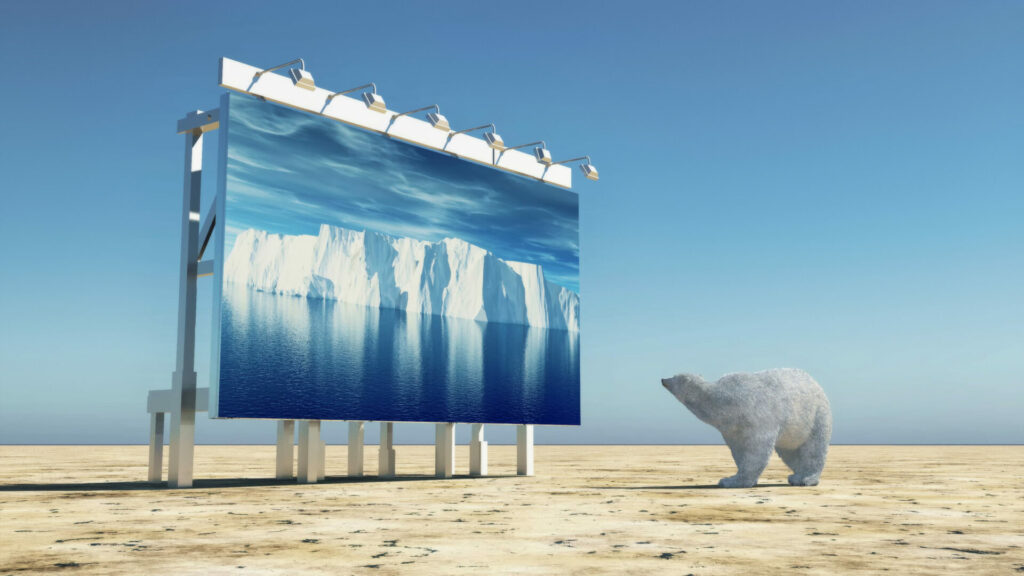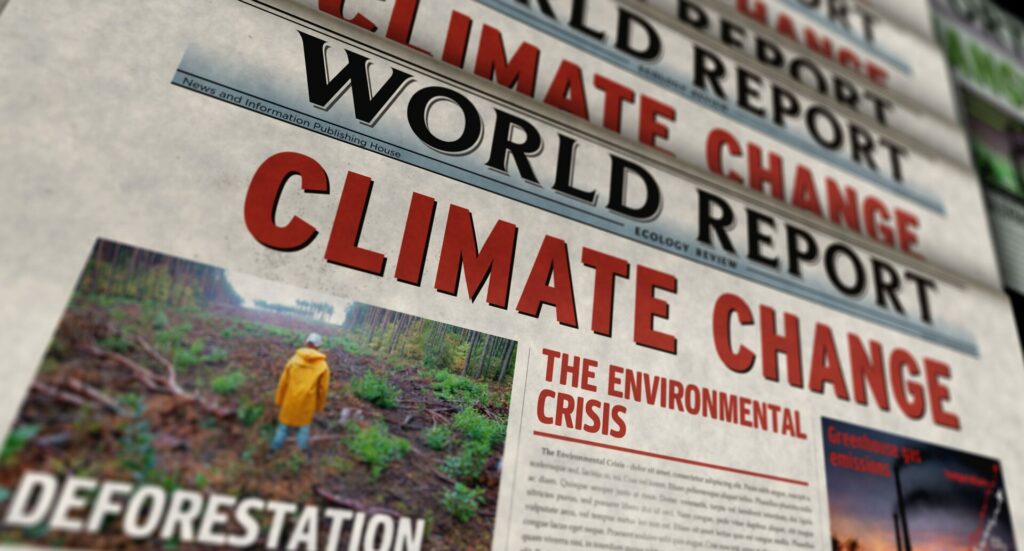The scenarios are all terrifyingly similar. ‘Suddenly the world went dark. All humans and animals received the message that the sun had died, and sea levels would soon rise – implying that’s how the world would end in the next few days.’
Luckily, it wasn’t a premonition or an apocalyptic vision of what was about to happen in a corner of the globe. It was ‘only’ a dream shared anonymously on a group for people whose nightly nightmares revolve around the climate crisis.
These scary scenarios are now becoming so frequent in dreams, they have prompting researchers to ask whether climate change is affecting and even changing the way our mind processes things while we sleep.
Climate-related dreams may be indicative of our worries about the environment and possible looming crises but simply ‘sleeping on it’ won’t take away our stress
Does this sound familiar? If your dreams are being infiltrated by visions of climate change, it can impact your day, as well as your nights, as you may find yourself thinking about dream scenarios and how they might be interpreted. Feelings of sadness, hopelessness and grief from these climate crisis driven dreams can have a profound effect leading even to depression.
Dream Therapy
Dreams have long been a source of fascination for many of us – from wondering what strange messages are being sent to us through unusual dreams to dissecting the meaning of last night’s reverie with friends over brunch or colleagues in the break room.
After many years of research, scientists have determined that dreams have a therapeutic effect, helping us deal with day-to-day events and stressors. Dr. David Kuhlmann, the medical director for sleep medicine at Bothwell Sleep Center, Missouri, explains that dreaming ‘helps improve the ability to handle stressful situations’ however he also notes that it doesn’t resolve all the emotional tension we may be carrying.
This is important to consider in terms of climate-related dreams, as they may be indicative of our worries about the environment and possible looming crises. But simply ‘sleeping on it’ won’t take away our stress completely.
Climate Crisis Dreams

While some people may have dreamt about floods or fires for some time, it was widely accepted by dream experts that these visions could arise from our emotional state. But times have changed and we’re now inclined to believe that this imagery is more literal, reflecting what we see either in our own landscape or onscreen. Our dreams are simply subconsciously expressing our thoughts and fears about the prospect of our environment changing.
And as the urgency around the situation – which has been discussed at the highest levels by global leaders and scientists for years – ramps up, it’s unsurprising that it should seep into our psyches. After all, the Covid-19 pandemic infiltrated our dreams within no time at all.
While it was reasonable to expect a change in our dreams due to the worldwide pandemic and the very real experience of mask wearing, lockdowns and anxiety about loved ones, the same is true of climate change.
In some places, people have already experienced the dramatic effects of global temperatures rising, including tourists having to be evacuated from holidays in Rhodes this summer or residents fleeing homes in California, both situations caused by raging wildfires. For others, they witness news items covering ecological disasters and it has an influence on their thoughts, if not consciously, then certainly unconsciously.

According to Dr. Valdas Noreika, who lectures psychology at Queen Mary University of London, we dream about things that provoke strong emotions and situations that we feel threatened by.
Because of the enormity of the climate crisis, we may feel paralysed in the face of it, and our dreams try to help us process it. This is why people dream of giant waves or tsunamis encompassing their neighbourhoods, cities on fire and cracked landscapes with no water for miles. When you read through the entries on climatedreams.com – a space where people can anonymously share the content of their nightly visions – it’s interesting how often flooding features. What is fascinating is that, in spite of the recent pandemic, hardly anyone reports dreaming about infectious disease outbreaks as a result of insects, though this is highly probable as different regions heat up.
How Different Demographics Dream
In a poll carried out this summer by Time magazine, it transpired that at least a third of Americans had dreamt about climate change. Those aged 18 – 41 (Gen Z and Millennials) report the most dreams about climate change, which correlates as this has been a talking point for a significant part of their lives.
Considerably more men (43 per cent) are dreaming about our changing planet than women (29 per cent). And it appears that higher earners must feel least affected as the numbers of those who report dreams about the climate begin declining once you earn over $50,000 (183,645 AED). In areas where extreme weather events have increased, particularly along the West coast, which has experienced drought and wildfires, half the respondents said that they’d had dreams filled with turbulent weather patterns.
But when you delve deeper into the data, it is intriguing to discover that not everyone is having nightmares about crops dying in the fields or massive tsunamis engulfing their towns.

Hope Among Millennials
Although many older people perceive their climate dreams as negative, one group stood out for reporting optimistic dreams in this category. Around 54 per cent of those in the 27 – 41 age group, known as Millennials, described feelings of hope, excitement and happiness when dreaming about climatic shifts or intense weather conditions. This demographic’s said their dreams included science far more than anyone else (at least 10 per cent more than all other groups) which may indicate that they were seeking solutions or considering how to tackle the consequences of global warming.
Dreams about innovative technologies, sustainable practices and community resilience in the face of environmental challenges reflect our desires for solutions. These dreams can inspire and serve as motivation to make changes in our waking lives that help protect our planet and future generations.
As we accept that climate change is not limited to the obvious physical and societal impacts but is penetrating our dreams, we are reminded by our roles as responsible caretakers of our planet
Climate change can also invade the dreamscape in other ways, not just through visible environmental changes. As we become more aware of our fragile planet, our dreams can help us cope; presenting serene views of nature, and captivating wildlife encounters and experiences where we feel in harmony with the world around us.
While the world grapples with finding solutions to mitigate the consequences of global warming, these themes drift into our subconscious for later processing.
In fact, they may actually hold the key to solving some of our issues. Albert Einstein claimed that he realised the theory of relativity in a dream about cows, while eminent German chemist, Friedrich August Kekulé, explained how the structure of a molecule came to him in a dream. Perhaps the young scientists of the world could task themselves to dream about new approaches to the obstacles arising from climate change?
Climate Anxiety
For children in particular, climate dreams can cause anxiety. Experts suggest that if you or your children experience eco-anxiety after a dream, a great way to combat this is by doing an activity that connects with the land. First People all over the world have never seen a separation between the Earth and its inhabitants, acknowledging that our health and wellbeing are dependent on our planets health and wellbeing.
In order to engage with your child or a loved one about their dreams, you can ask the following questions.
- Who else is in your dream? Do they have a relationship to you?
- What connection do you have to the place in your dream? Is it somewhere you’re familiar with?
- Does it feel like your home is in danger?
- Can you find anything hopeful in your dream? Are the other people hopeful?
By asking these questions, you can determine where the anxiety might arouse from and hopefully ease or address what is within your control to change. Many experts suggest that spending time with nature or doing things like planting flowers or trees can help the individual to deal with the negative emotions their dreams stir up. Small actions can help make us feel like we are making a difference or at least give us an element of control over our direct environment.
An Archive Of Dreams
Therapist Martha Crawford, who says ‘dreams are an essential element of the atmosphere we move through, and learning to listen to your dream life is like becoming weather wise,’ founded the Climate Dreams Project in 2019.
After noticing that her own dreams were less fragmented and much more specific about “her own internal weather report”, she created a website where people could discuss and share their dreams on the climate crisis, often anonymously.
It has become a fascinating resource that provides comfort to people when they discover that they are not alone in dreaming up the worse-case scenarios about our planet. It may also inspire sustainable solutions or ideas on adaptability as the looming transformation of Earth takes place.
As we accept that climate change is not limited to the obvious physical and societal impacts but is penetrating our dreams, we are reminded by our roles as responsible caretakers of our planet. Recognising and understanding our dreams manifestations can help us cope with the emotional toll of climate change, while serving as a catalyst for positive actions to enhance our future.













